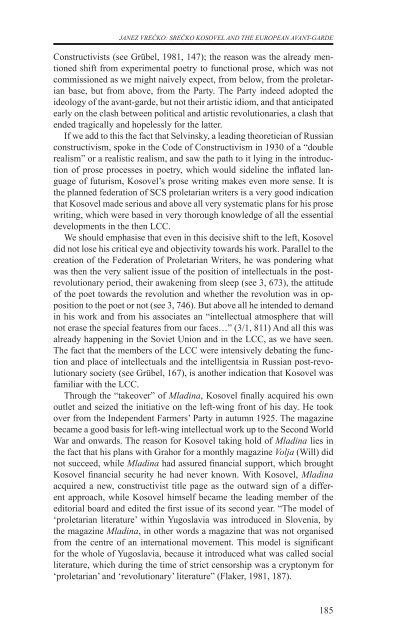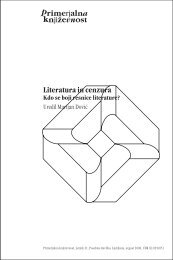razprave (pdf) - Društvo za primerjalno književnost - ZRC SAZU
razprave (pdf) - Društvo za primerjalno književnost - ZRC SAZU
razprave (pdf) - Društvo za primerjalno književnost - ZRC SAZU
- No tags were found...
You also want an ePaper? Increase the reach of your titles
YUMPU automatically turns print PDFs into web optimized ePapers that Google loves.
Janez Vrečko: Srečko Kosovel and the European avant-gardeConstructivists (see Grübel, 1981, 147); the reason was the already mentionedshift from experimental poetry to functional prose, which was notcommissioned as we might naively expect, from below, from the proletarianbase, but from above, from the Party. The Party indeed adopted theideology of the avant-garde, but not their artistic idiom, and that anticipatedearly on the clash between political and artistic revolutionaries, a clash thatended tragically and hopelessly for the latter.If we add to this the fact that Selvinsky, a leading theoretician of Russianconstructivism, spoke in the Code of Constructivism in 1930 of a “doublerealism” or a realistic realism, and saw the path to it lying in the introductionof prose processes in poetry, which would sideline the inflated languageof futurism, Kosovel’s prose writing makes even more sense. It isthe planned federation of SCS proletarian writers is a very good indicationthat Kosovel made serious and above all very systematic plans for his prosewriting, which were based in very thorough knowledge of all the essentialdevelopments in the then LCC.We should emphasise that even in this decisive shift to the left, Kosoveldid not lose his critical eye and objectivity towards his work. Parallel to thecreation of the Federation of Proletarian Writers, he was pondering whatwas then the very salient issue of the position of intellectuals in the postrevolutionaryperiod, their awakening from sleep (see 3, 673), the attitudeof the poet towards the revolution and whether the revolution was in oppositionto the poet or not (see 3, 746). But above all he intended to demandin his work and from his associates an “intellectual atmosphere that willnot erase the special features from our faces…” (3/1, 811) And all this wasalready happening in the Soviet Union and in the LCC, as we have seen.The fact that the members of the LCC were intensively debating the functionand place of intellectuals and the intelligentsia in Russian post-revolutionarysociety (see Grübel, 167), is another indication that Kosovel wasfamiliar with the LCC.Through the “takeover” of Mladina, Kosovel finally acquired his ownoutlet and seized the initiative on the left-wing front of his day. He tookover from the Independent Farmers’ Party in autumn 1925. The magazinebecame a good basis for left-wing intellectual work up to the Second WorldWar and onwards. The reason for Kosovel taking hold of Mladina lies inthe fact that his plans with Grahor for a monthly magazine Volja (Will) didnot succeed, while Mladina had assured financial support, which broughtKosovel financial security he had never known. With Kosovel, Mladinaacquired a new, constructivist title page as the outward sign of a differentapproach, while Kosovel himself became the leading member of theeditorial board and edited the first issue of its second year. “The model of‘proletarian literature’ within Yugoslavia was introduced in Slovenia, bythe magazine Mladina, in other words a magazine that was not organisedfrom the centre of an international movement. This model is significantfor the whole of Yugoslavia, because it introduced what was called socialliterature, which during the time of strict censorship was a cryptonym for‘proletarian’ and ‘revolutionary’ literature” (Flaker, 1981, 187).185
















